Last Updated on: 31st January 2025, 02:32 pm
Choosing the Best Country To Raise A Family is a significant decision for many parents, particularly in 2025. As families around the world seek new opportunities and better living conditions, understanding which nations rank as the most family-friendly becomes paramount. Numerous factors contribute to this ranking—everything from safety and healthcare to educational quality and cultural support plays a vital role. Countries such as Sweden, Norway, and Iceland frequently top the lists for their exemplary national policies that prioritize family welfare1. With UNICEF’s insights highlighting these nations as leaders in fostering environments conducive to raising children, parents can find reassurance in these expert picks. As we delve deeper into the specifics of these rankings, we will uncover what truly makes these nations among the Top Countries for Children in 2025.
Key Takeaways
- Sweden, Norway, and Iceland are leading choices for raising families, according to UNICEF rankings.
- Denmark offers a well-balanced environment with high GDP per capita and robust family support systems.
- Education and healthcare quality are significant factors in determining family-friendliness.
- Australia is celebrated for its natural beauty and comprehensive public services.
- Estonia stands out with its innovative educational infrastructure and technological advancements.
Introduction: The Importance of Choosing the Right Country for Family Life
Selecting the ideal country for raising a family can significantly influence your family’s quality of life. Parents often seek Ideal Places for Parenting that offer support systems for children at various stages of development. Factors such as economic stability, healthcare access, and educational quality play critical roles in this decision-making process. European nations are noted leaders in these areas, where eight out of the top ten countries for supporting working families are based in Europe, showcasing their extensive family policies2. Countries like Norway, Sweden, and Denmark lead in work-life balance, with impressive index scores of 79.57, 78.01, and 77.23, respectively2.
While urban living can present opportunities in terms of education and employment, it often brings challenges like high living costs and varying school quality, making it essential for families to weigh their options. Safe Havens for Families are often found in suburban or rural areas, where affordability is greater and living conditions tend to be less stressful. The higher crime rates in metropolitan areas further emphasize the need for careful evaluation3.
Looking beyond financial metrics, the emotional and social aspects of raising children require nurturing environments that support overall well-being. Nurturing Environments for Kids foster positive development, providing children with the tools to thrive. As families consider relocation, understanding how each country aligns with their values and needs plays a vital role in making informed decisions.
Criteria for Evaluating Family-Friendly Nations
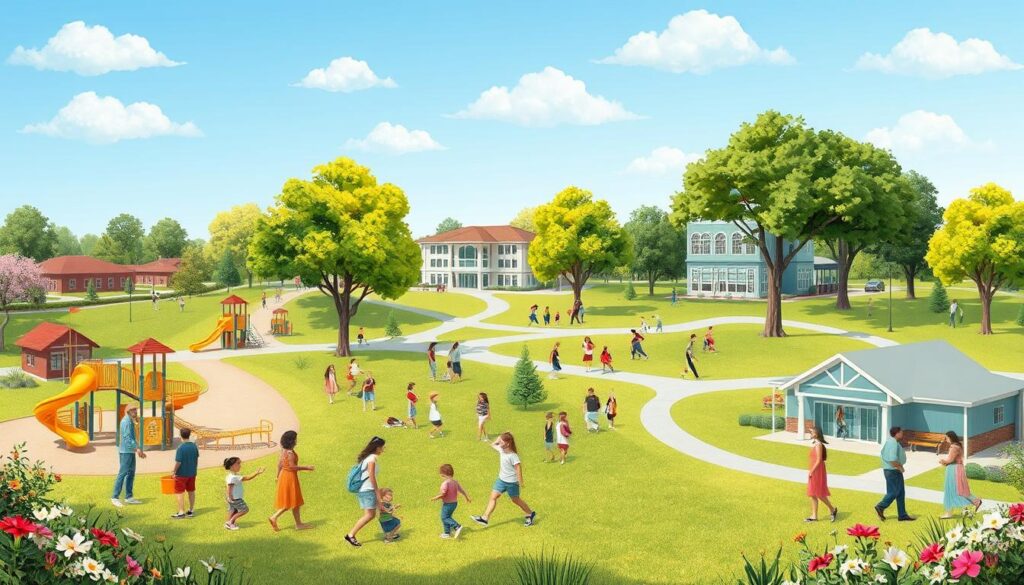
When assessing potential destinations for families, several key criteria must be considered. These factors are essential in determining which countries can provide the most nurturing environments for children. Family-Oriented Cultures often emphasize safety, education quality, healthcare services, and a healthy work-life balance as paramount for families.
Safety and Security
Safety is a foremost concern for families. Nations with lower crime rates and better public safety measures naturally attract parents worried about their children’s welfare. According to statistics, the homicide rate per 100,000 people plays a crucial role in evaluating safety levels in different countries4. Furthermore, indices like the Global Law & Order Index and Global Peace Index help outline how safe families feel in their neighborhoods4. The presence of rights and freedoms reinforces this security perception, contributing to healthier family life.
Quality of Education
Investments in education systems reflect a nation’s commitment to its youth. Access to quality education is critical for families considering relocation. Countries where public spending on education is prioritized tend to rank higher in terms of overall family well-being. Additionally, affordable childcare options can greatly influence a family’s decision to settle in a particular nation5. Sweden, for instance, boasts low childcare costs compared to other European nations, making it an attractive option for families.
Healthcare Services
Access to quality healthcare services is non-negotiable for families. Nations that prioritize healthcare spending and make it accessible to all citizens, including children, rank higher among Supportive Nations for Raising Children. Out-of-pocket health spending in various countries significantly impacts families, as higher expenses can strain household budgets4. Given the critical nature of maternal health, countries with lower maternal and under-five child mortality rates often reflect a robust healthcare system.
Work-Life Balance
A balanced life can greatly enhance a family’s quality of life. Nations like Norway and Sweden rank highly in the Parental Life-Work Balance Index, indicating strong support for working parents5. The availability of statutory leaves and affordable childcare options can ease the stress working parents experience, allowing them to focus more on their families. This balance is vital, as it fosters a stable home environment conducive to children’s growth.
Top Countries for Children in 2025
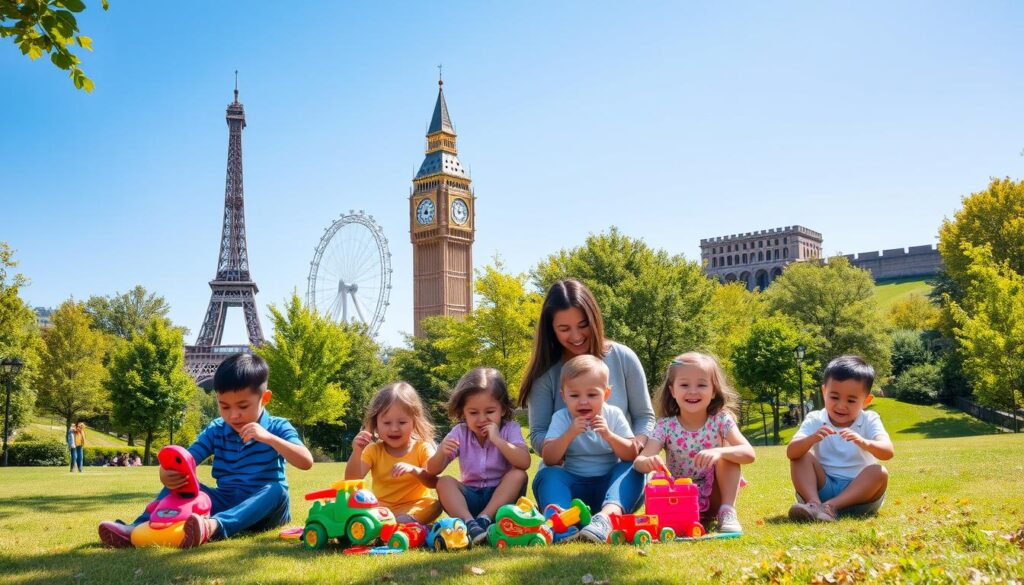
As families look for ideal environments to raise their children, various rankings highlight the best options available. According to UNICEF and other reliable studies, South Korea is recognized as the best country for a child to be born in 2025, achieving a remarkable score of 97.26 in categories such as nutrition and health, and education and well-being6. Norway follows closely with a score of 97, showcasing its commitment to child welfare through superior health and educational systems6.
Overview of Rankings Using UNICEF and Other Studies
Countries such as Finland, Sweden, and Denmark also stand out in these rankings, known for their strong safety nets, education systems, and family-oriented policies. The United States, while ranked 35th with a score of 83.34, reflects significant disparities in child welfare, particularly when compared to Family-Friendly Nations at the top of the list6.
Factors Contributing to Ranking
Key factors contributing to these rankings include educational investment, healthcare accessibility, and social support systems. For instance, Argentina’s commitment to education is evident with an impressive literacy rate of 98.09% and a substantial allocation of 11.9% of its GDP towards its education sector7. In Romania, generous maternity leave policies, offering 65 days of paid leave, further underscore the supportive measures available for families7.
In addition, countries such as Turkey have increased their education budgets significantly, reaching 651 billion Turkish liras in 2023, which is indicative of the support for children’s education7. With a comparative approach, the top countries for children succeed in creating environments where families can thrive, blending essential social, economic, and health policies to support every child’s growth and development.
Best Country To Raise A Family: Sweden
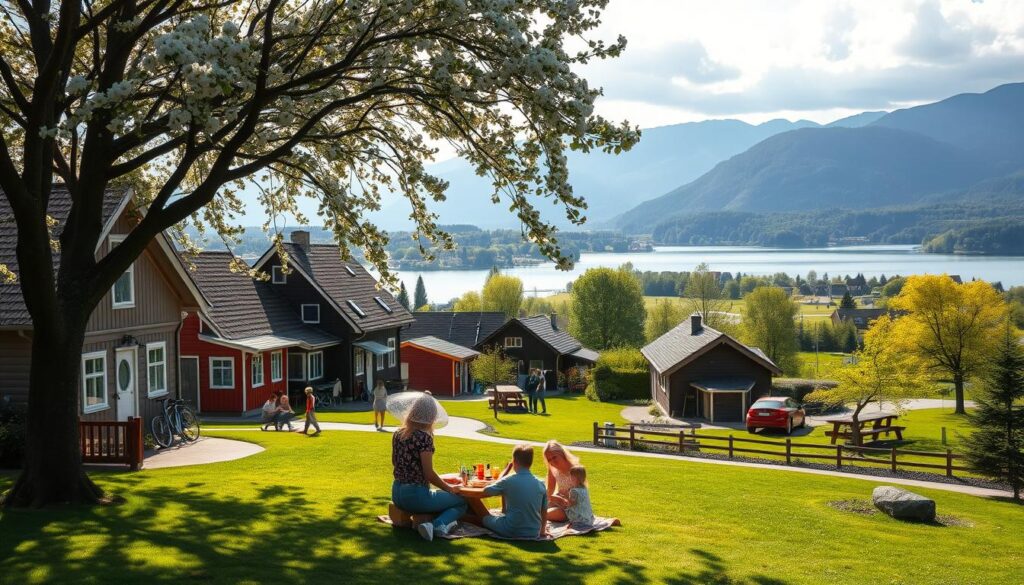
Sweden stands out as a premier destination for nurturing families, largely due to its robust policies that prioritize the well-being of children and parents alike. The country consistently ranks among the top nations globally for family life, making it the Best Country To Raise A Family.
Policies that Support Families
The Swedish government has established exemplary parental leave policies, offering families a generous 480 days of paid leave, ensuring parents receive 80% of their income while caring for their children8. This system is designed to promote equality, with a portion of the leave reserved for fathers, highlighting Sweden’s dedication to child-centric societies.
Additionally, the government provides financial support through a monthly allowance for parents, helping mitigate the cost of raising children9. Sweden excels in education and healthcare, both of which are offered without charge, further demonstrating the country’s commitment to fostering a healthy upbringing.
Childcare and Parental Leave Benefits
In terms of childcare, Sweden is ranked first globally, providing parents with 525 free hours a year for children aged three and above8. The nation’s approach to childcare costs emphasizes accessibility, alleviating financial burdens on families and fostering a supportive environment for raising children.
Healthcare services rank highly as well; with free access to medical services and education, Sweden ensures families achieve optimal well-being. These initiatives highlight Sweden’s comprehensive strategy to create a secure and nurturing atmosphere for families to thrive1.
| Category | Sweden | Ranking |
|---|---|---|
| Childcare Quality | Excellent | 1st |
| Paid Parental Leave | 480 days | Top Tier |
| Healthcare Access | Free | High |
| Education Quality | Free | High |
| Monthly Child Allowance | Yes | Available |
Family-Oriented Cultures: Denmark and Norway
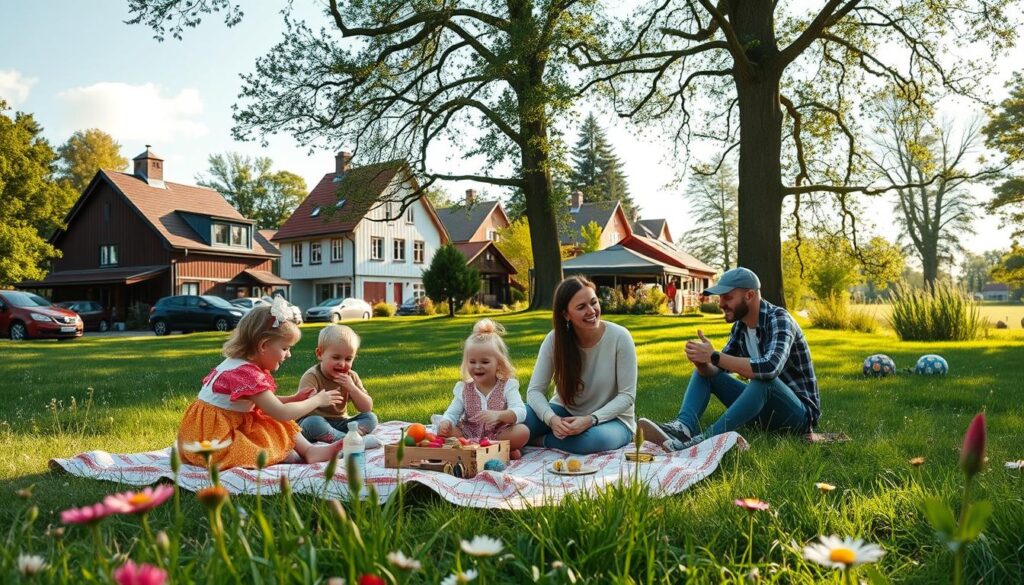
Denmark and Norway are recognized globally for their strong emphasis on family-friendly policies and societal frameworks. These nations exemplify Family-Oriented Cultures that prioritize holistic development for children and family well-being. A significant aspect of these cultures is the access to affordable childcare systems, which contribute to a nurturing environment.
Childcare Systems and Costs
In Denmark and Norway, childcare costs are notably low compared to the global average, allowing families to allocate resources more efficiently. Households typically spend only 4% to 10% of their income on raising a child, compared to much higher percentages in other regions9. This financial support extends to various types of family formations, with Denmark recognizing an impressive 37 family unit types that reflect its acceptance of diverse family dynamics10.
Quality of Life and Happiness Ratings
The quality of life in these Scandinavian nations is highly rated, with Denmark achieving a life satisfaction score of 7.5 out of 10, positioning it as one of the best places for young families11. The happiness levels are bolstered by comprehensive welfare policies, ensuring that families feel secure and valued. Children in these countries enjoy a balanced lifestyle where education starts later, ensuring a strong emphasis on play and outdoor activities, contrasting sharply with less favorable environments reported elsewhere10.
| Country | Childcare Cost (% of Income) | Life Satisfaction Score | Family Unit Types |
|---|---|---|---|
| Denmark | 4% – 10% | 7.5/10 | 37 |
| Norway | 4% – 10% | 7.4/10 | 21 |
Nurturing Environments in Finland and Iceland
Finland and Iceland stand out as remarkable examples of nurturing environments for kids, showcasing commitment to family welfare and community support. These countries provide significant safety ratings paired with strong community networks, contributing to their status as ideal places for parenting.
Safety Ratings and Community Support
Both Finland and Iceland boast exceptional safety ratings, making them secure options for families. In Iceland, a unique cultural aspect includes the practice of taking babies to swim lessons as early as three months, promoting early development and socialization within the community12. Additionally, the social support system in Iceland adapts to family dynamics, with many children being born outside of wedlock but still enjoying strong family ties12. Finland complements this by offering community programs that foster connections among families, significantly enhancing the nurturing environment.
Access to Education and Early Childhood Development
Access to education is a cornerstone of both countries’ commitment to early childhood development. Finland’s baby box initiative stands as a testament to their dedication to providing essential resources for newborns and their families, making it an attractive destination for expat families13. This initiative reflects Finland’s broader investment in education, contributing to its outstanding rankings across various global studies. With these nurturing environments and focus on family needs, Finland and Iceland clearly exemplify some of the best atmospheres for raising children.
Emerging Family-Friendly Nations: Estonia and Portugal
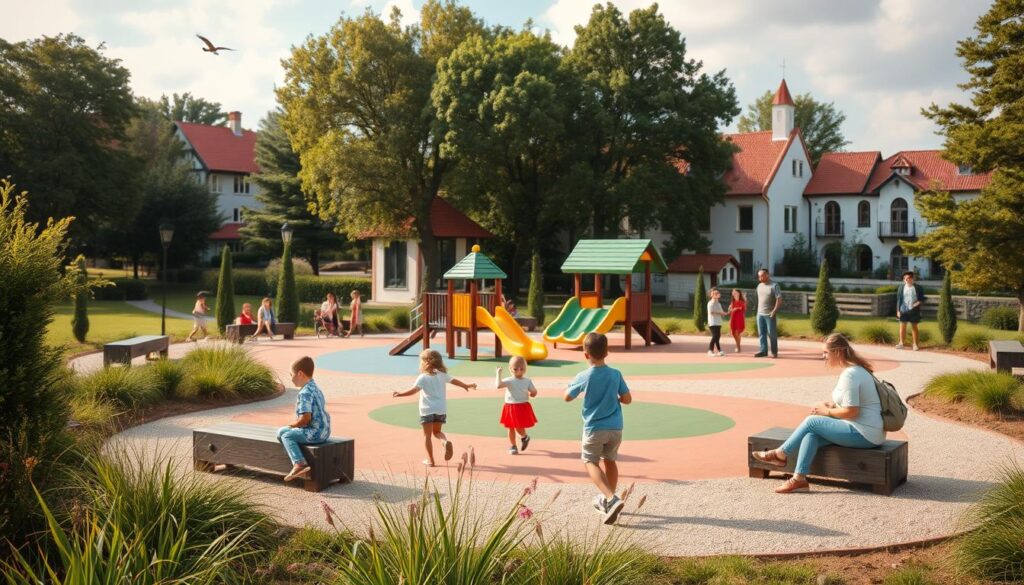
As families seek the most nurturing environments, Estonia and Portugal emerge as exceptional choices. These Emerging Family-Friendly Nations offer innovative educational systems and robust healthcare frameworks that prioritize child development and family well-being.
Innovative Education Systems
Estonia stands out with its digital-first approach in the education sector. The country not only emphasizes digital literacy but also social-emotional development from early childhood onward. This progressive education system supports children in adapting to an increasingly digital world14. Portugal complements this with its focus on free public education, available from kindergarten through secondary school, fostering a lifelong love for learning14. Together, these countries provide families with opportunities for high-quality education, ensuring children are well-prepared for future challenges.
Quality of Healthcare and Child Support Services
Both nations excel in providing a supportive healthcare system. Estonia offers the longest duration of leave at full pay for mothers, totaling 85 weeks, making it a leader in parental leave policies15. In conjunction, Portugal maintains high-quality healthcare services that are accessible to all, alongside affordable childcare options. These services ease the financial burden on families, allowing parents to focus on raising their children14.
Ultimately, the combination of impressive educational frameworks and comprehensive healthcare services makes Estonia and Portugal stand out as prime destinations for families looking to thrive in a supportive environment.
Supportive Nations for Raising Children: Germany and France
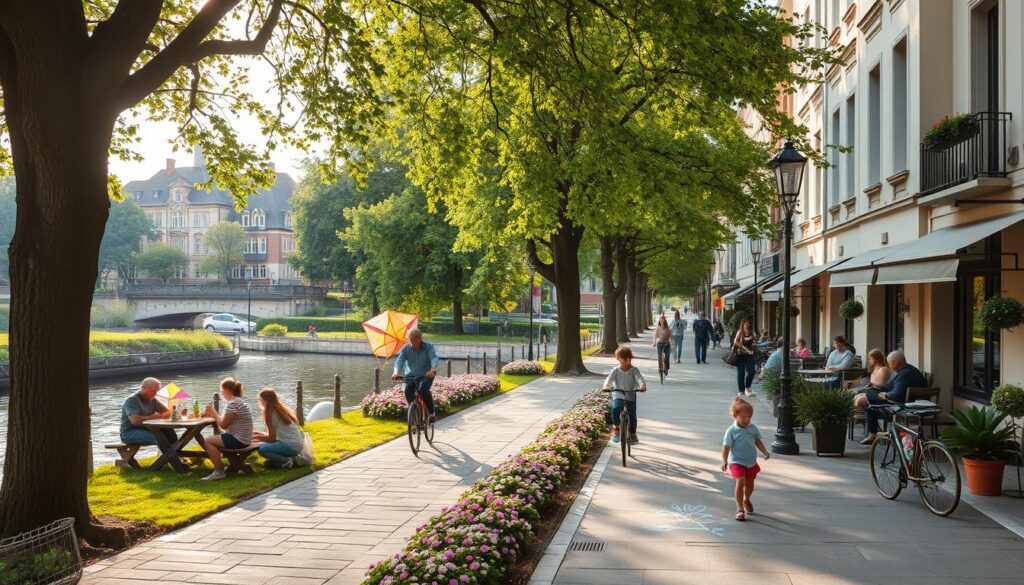
Germany and France stand out as prime Supportive Nations for Raising Children, boasting extensive governmental initiatives aimed at enhancing family life. These nations prioritize the needs of families, providing a mixture of financial support, accessible childcare, and essential parental rights, all designed to create a nurturing environment for children.
Governmental Support for Families
In Germany, the concept of family is evolving, as seen through the introduction of policies supportive of various family structures. The country’s birth rate saw a decline, dropping by 7.1% from 2021 to 2022, with approximately 739,000 children born during that time16. Notably, in the same year, Germany reported 1.46 children born per woman, marking the lowest rate since 201316. This reduction is not just a number; it reflects changing societal dynamics where families are adapting to economic and personal aspirations. Single-parent households numbered around 2.3 million mothers and 487,000 fathers in 2022, further illustrating this shift16.
Workplace Policies favoring Family Life
France, alongside Germany, showcases remarkable Family-Oriented Cultures through its workplace policies that prioritize work-life balance. Both nations have implemented generous parental leave schemes that allow parents to spend quality time with their infants. In Germany, policies ensure job protection during maternity and parental leaves, allowing parents to return to their jobs without concerns. This kind of support leads to better educational resources, fostering overall happiness within families16.
The dedication of Germany and France to providing robust family support systems underscores their commitment to nurturing future generations and creating conducive environments for raising confident, well-rounded children.
Exploring Other Family-Friendly Options: Switzerland and Australia
When considering Ideal Places for Parenting, Switzerland and Australia stand out for their high living standards and excellent work opportunities. Both nations emphasize family values, offering strong support systems that contribute positively to family life.
Living Standards and Work Opportunities
Switzerland boasts one of the best health and education systems globally, with an impressive income equality rate of 56.5%17. The country is recognized for its low crime rates and a stable economy that supports diverse job opportunities. Australia follows closely, offering government-funded programs that assist families, coupled with a culturally varied environment17. With stable living conditions supported by effective public services, both nations create a nurturing atmosphere for families.
Available Activities and Family Support Systems
Families in Australia can explore a rich tapestry of activities suitable for children, including outdoor adventures and cultural experiences. A diverse selection of accommodations caters to family needs, enhancing their travel experiences18. Infant formula, baby food, and diapers are readily accessible, making life easier for parents18. Traveling to Australia does involve some considerations, such as understanding restrictions on bringing fresh food into the country, but the vibrant food scene makes up for it18. In Switzerland, parents can enjoy activities that promote learning while spending quality time together, fostering a strong family bond.
Conclusion
In summarizing the insights on the Best Country To Raise A Family, it becomes clear that family-friendly nations prioritize various elements essential for positive upbringing. Countries like Sweden and Norway exemplify comprehensive family policies, while Australia offers diverse options across its cities, from Melbourne’s education high standards to Perth’s safety measures that cater to families. Additionally, nations like Germany and France shine through their governmental support structures, which ease the burden of parenting.
However, personal circumstances and individual preferences ultimately dictate which location aligns best with family objectives. Factors such as the cost of living, quality of healthcare, and education standards are critical in making a choice among the highlighted Family-Friendly Nations. For instance, cities such as Brownsville and McAllen in the U.S. offer affordable living conditions for families, reflecting the varying priorities each family might have.
As families contemplate their ideal environment, whether it’s the healthcare excellence in Sydney or the strong community in Hobart, the emphasis should remain on values that resonate most deeply with them. The decision of where to raise children involves weighing these elements carefully, ensuring that the chosen country provides not just a place to live, but a nurturing atmosphere that fosters their growth and well-being. The journey of selecting the best habitat requires reflection and alignment with personal aspirations, guiding families toward a fulfilling life192021.
FAQ
What factors should I consider when choosing the best country to raise a family?
Which country is regarded as the best for raising children in 2025?
How does the availability of childcare influence family life in different countries?
What makes Denmark and Norway family-friendly nations?
Are there emerging countries that are becoming more family-friendly?
How do governmental policies impact family life in Germany and France?
What can families expect from countries like Switzerland and Australia?
Source Links
- https://www.william-russell.com/blog/best-countries-to-raise-family-relocating-expat-kids/
- https://remote.com/resources/research/parental-life-work-balance-index
- https://www.chase.com/personal/mortgage/education/finding-a-home/city-vs-country-living
- https://www.asherfergusson.com/raising-a-family-index/
- https://www.familyfriendlyworking.co.uk/2024/05/24/best-countries-for-working-parents/
- https://ceoworld.biz/2024/04/05/ranked-the-worlds-best-countries-for-a-child-to-be-born-in-2024/
- https://www.insidermonkey.com/blog/35-best-countries-for-raising-kids-1216869/
- https://nyshipping.com/worlds-top-10-countries-raising-family
- https://www.forbes.com/sites/laurabegleybloom/2020/07/29/best-worst-countries-raise-family/
- https://www.theguardian.com/lifeandstyle/2024/feb/25/play-outside-and-sing-together-living-in-denmark-and-raising-viking-children
- https://www.cia-landlords.co.uk/news/best-scandinavian-country-for-young-families-to-move-to/
- https://cupofjo.com/2016/07/11/parenting-in-iceland/
- https://iss-relocations.com/best-countries-to-raise-a-family/
- https://finance.yahoo.com/news/35-best-countries-raising-kids-173710015.html
- https://workinestonia.com/sweden-norway-iceland-estonia-and-portugal-rank-highest-for-family-friendly-policies-according-to-unicef/
- https://www.expatica.com/de/living/family/growing-up-german-raising-kids-as-an-expat-in-germany-100897/
- https://www.theblogler.com/best-places-to-raise-family/
- https://fullsuitcase.com/australia-travel-kids/
- https://www.icaustralia.com/10-best-cities-australia-raise-family/
- https://www.quickenloans.com/learn/best-places-to-raise-a-family
- https://www.financialsamurai.com/ideas-providing-stimulating-childhood/

As a passionate, global-thinking Real Estate Investor I am constantly looking for the best opportunities to invest in Properties. With Aparthotel.com I am building an All-In-One Global Real Estate Platform, where people can analyse, rent or invest in properties. Additionally I help Investors with comparing the best financing options as well as give detailed Consultation on the buying process for Real Estate Investments around the world. I am looking forward to sharing my knowledge on this Website and feel free to reach out to me if you have any questions.

Comments